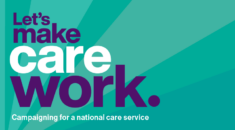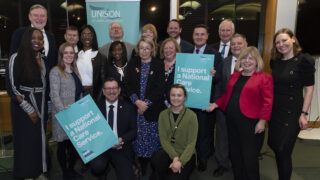Care workers are among those continuing to keep the country running throughout the COVID-19 pandemic.
Nicola Hollingsworth is one of the UK’s 1.6 million care workers. A support worker in Thanet, specialising in end-of-life care, Nicola spends her days visiting people’s homes and supporting them to live their final days with independence and dignity.
“End of life care looks different for different people,” she explains. “Some people are already bed-bound by the time we get involved and some are still quite able. Part of the skill of the job is knowing how to constantly switch gears between each visit.
“Today, I’ve got one chap who’s bed-bound but totally with it, followed by a woman who’s very mobile. You can’t go into everyone’s home and treat them all the same.”
Providing end-of-life care is an emotionally demanding role.
“Sometimes it’s really hard because you get attached to the people you’re caring for. It’s not like we don’t know what’s going to happen, but it’s still hard,” says Nicola.
“A gentleman passed away yesterday who was full of life and so cheeky, and I used to really get on with him and his wife. It was so sad that he died, and now his wife is completely on her own because of lockdown. I wish I could go and look after her as well, but I can’t.”
Describing her work as the most “exhausting job on the planet” because of the emotional toll it takes, Nicola points out that few people realise just how much is involved. For instance, the job doesn’t only involve the person who is nearing the end of their life. “A lot of the work we do is also reassuring people’s partners and family,” Nicola observes.
Despite the high degree of empathy, energy and emotion involved in care work, three in four care workers do not get paid a living wage. This is why UNISON is currently supporting a petition for a real living wage for carers.
Nicola is paid above the minimum wage, but says that more is needed.
“We need to see a wage increase and a pay structure that makes sense. Right now, there’s a mix of some of us on NHS salaries, and some of us working for private agencies. In my last job, I earned more than my senior did by £1.20 an hour.”
Despite the brief recognition that ‘clap for carers’ offered early in the pandemic, it was of little lasting value. A year into the coronavirus crisis, without any increase in pay or improvement in conditions, Nicola reflects on her own disappointment.
“It was a cute idea. But it might have worked better if the government had just paid us more. Clapping is nice and we appreciate people taking notice, but we just want to be paid well for what we do.
“I don’t think the government even recognises what we do,” she says.
“I’d love to get Boris Johnson in my car and take him with me to work. When any of these politicians are dying, they’re going to be relying on us to help them through with their dignity intact.”



